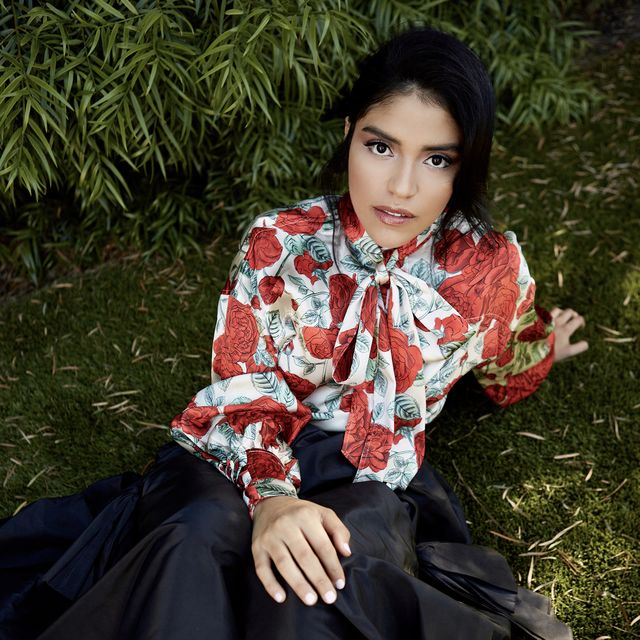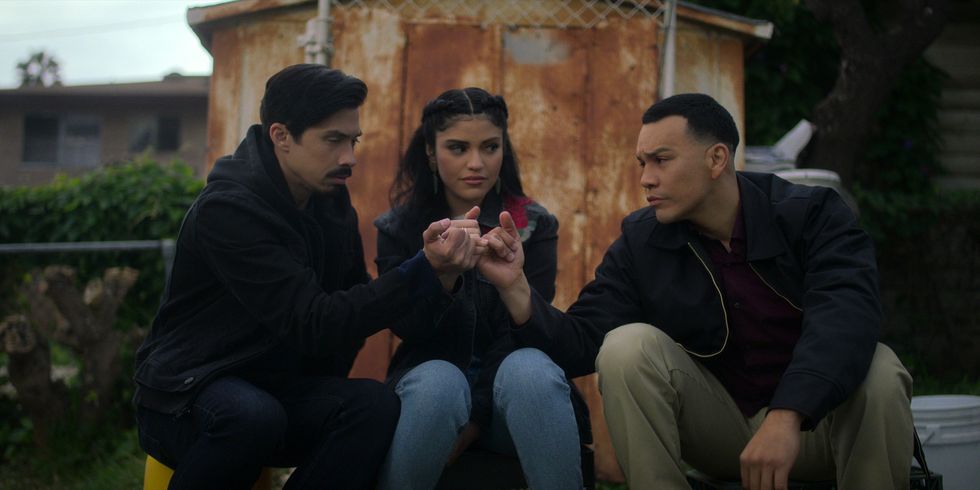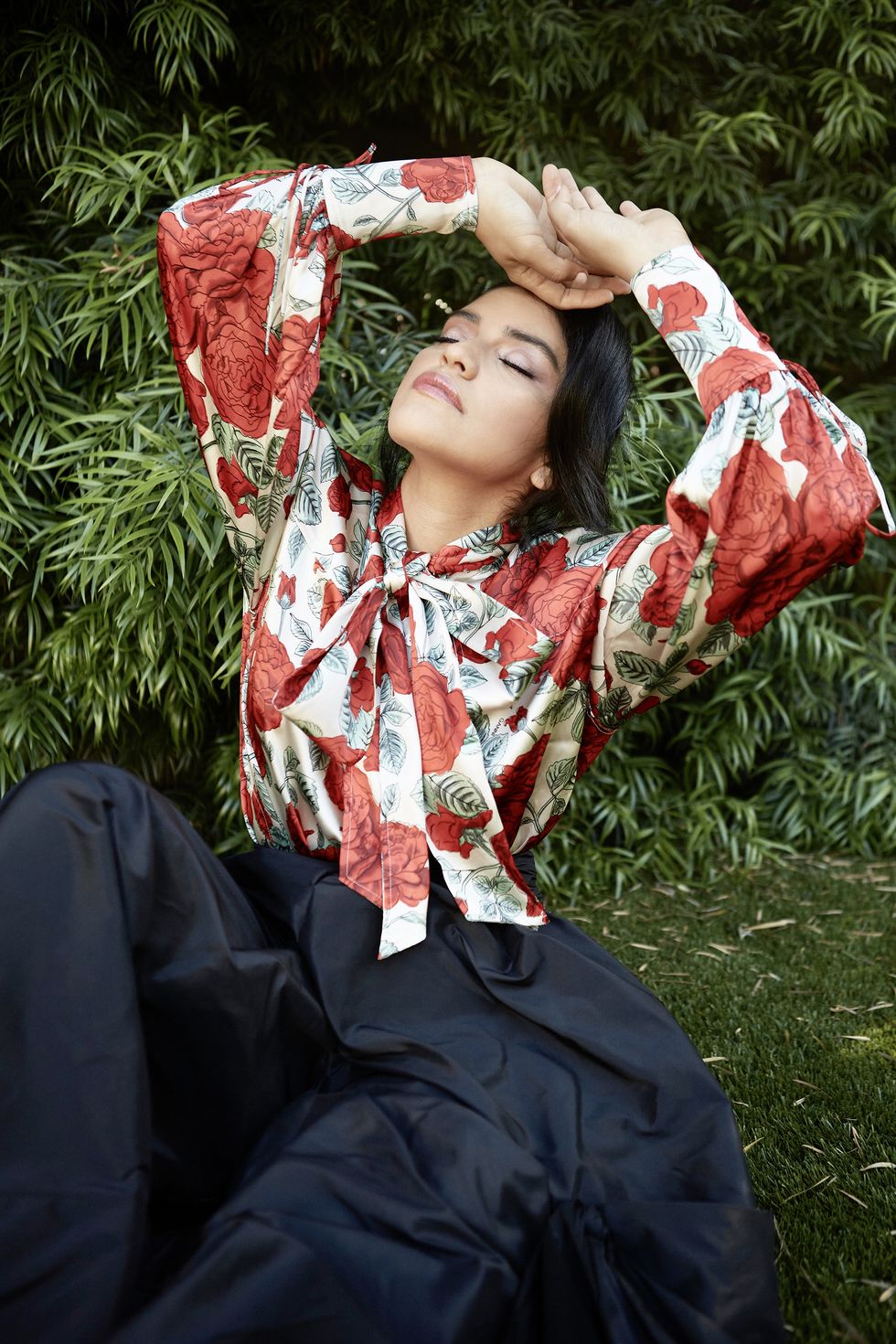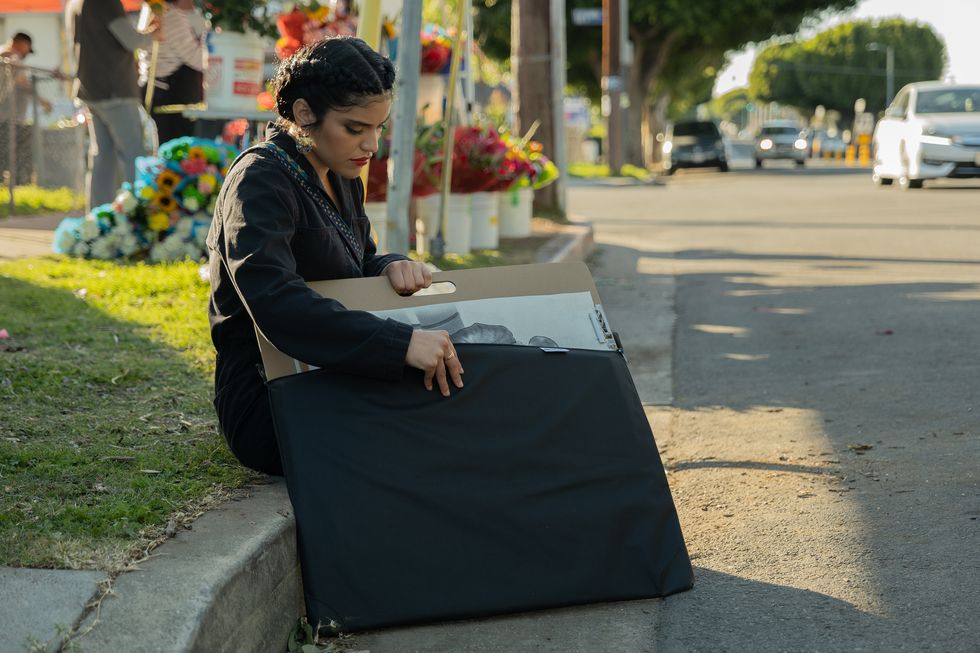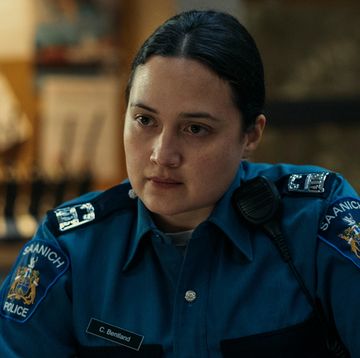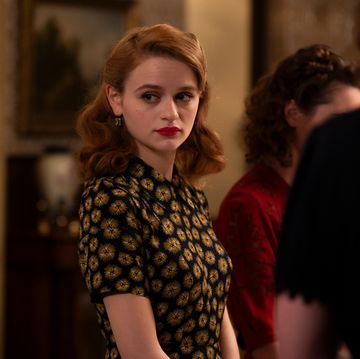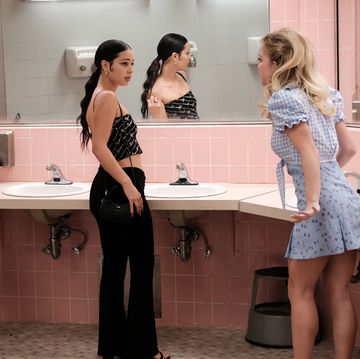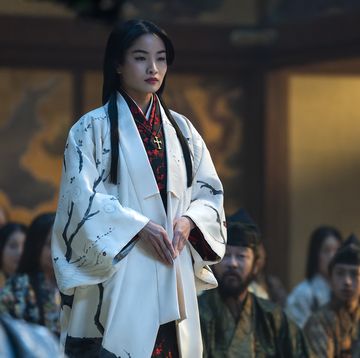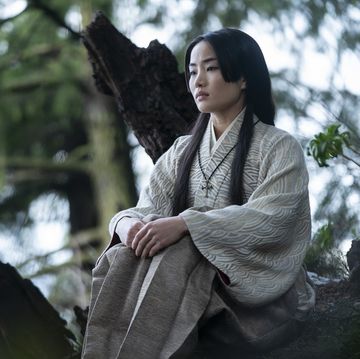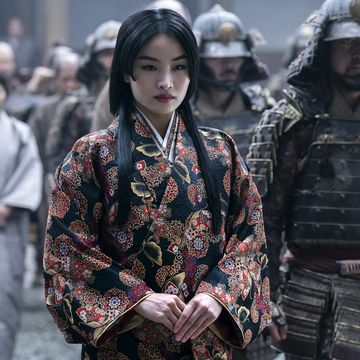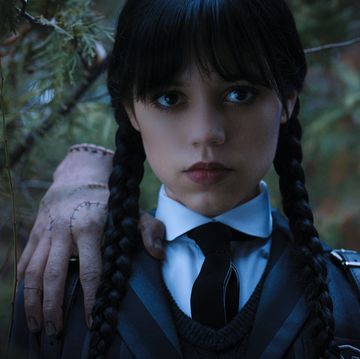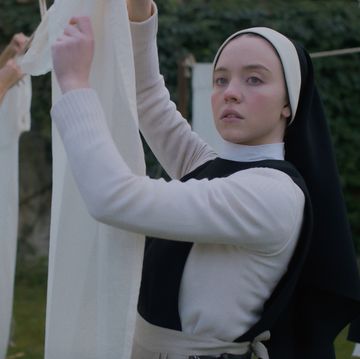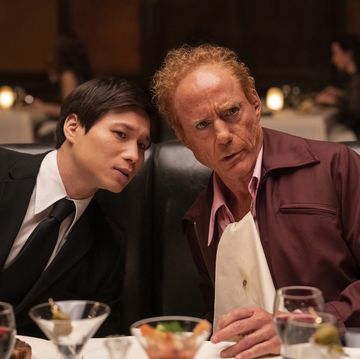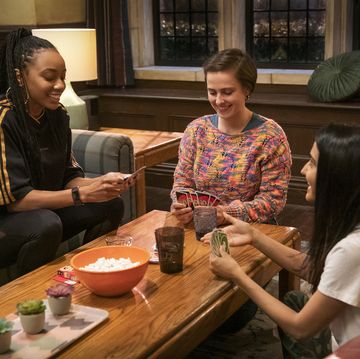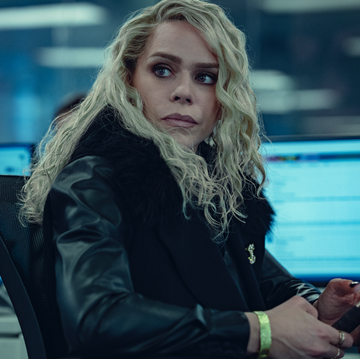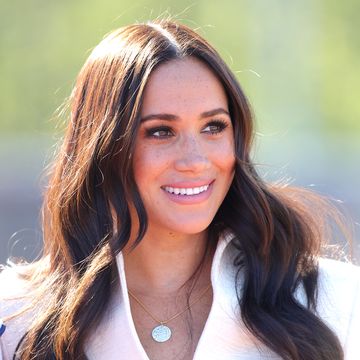When I ask Karrie Martin Lachney what her dream role is, she nearly blushes when she admits it: She wants to be in a Nicholas Sparks movie. “I am such a hopeless romantic. And I’m never going to stop saying it,” she confesses. “I’m going to keep putting it out there.” The actress can’t help but fangirl. She met the author at a book signing once (for Safe Haven); she’s ugly-cried to his books (especially The Last Song); and See Me, if it’s ever adapted, would be her ultimate lead role.
“There’s something about the love, the loss, and the raw emotion,” she says of Sparks’ books, gushing over Zoom. “I’m getting teary-eyed just saying it, I don’t know what it is. I love feeling. And I feel like those characters feel so deeply.”
But she doesn’t have to be in a Sparks project to reach that range of emotion onscreen. On Gentefied, the Netflix dramedy in which she stars, her character Ana “feels without regard”—especially in the second season, where she’s fighting for her success as an artist and her family’s protection after her grandfather is deported.
It’s no romantic novel, but Gentefied is its own kind of love story. It’s about the complicated but persevering love for one’s family, home, partner, and oneself, and what those things mean in the context of a multi-generational immigrant household. Adapted from the 2017 Sundance project of the same name, Gentefied follows three Mexican-American cousins in Boyle Heights, CA who are each trying to pursue their dreams while helping their grandfather keep their family taco shop alive in their quickly-gentrifying neighborhood.
In season 2, now streaming, Ana is actively advocating for her grandfather (aka “Pop,” played by Joaquín Cosío), who is undocumented, to stay in the country. At the same time, she’s breaking through as a Chicana artist, but her voice and style clash with the expectations of her corporate—and very white—clients. And to top if off, she’s still recovering from her breakup with ex girlfriend Yessica (Julissa Calderon), whom she continues to run into.
After Gentefied first hit Netflix in 2020, Martin Lachney got messages from viewers who felt seen, even if they weren’t Latinx. “After season 1, people from countries that were not Latin countries [or] Hispanic countries, were reaching out to us and saying, ‘Thank you so much, because I saw myself, I saw my parents, I saw their struggle,’” she recalls. “And I don’t even know what I was expecting when that show premiered, but that was absolutely not what I was expecting.”
Here, Martin Lachney talks filming Gentefied season 2, working with “boss” director America Ferrera, and how she never forgot her roots.
What was it like reuniting with the Gentefied cast this time around? Did you all feel closer when you returned to set?
When we came back on set this time around, obviously it was a COVID set. But honestly, that did not stop this experience from feeling like returning home. The guys and I specifically, all three of us met, I believe, on the same day in the audition process. And I felt like I had known them my entire life after that producer session audition. J.J. Soria [Erik] talks about it all the time. He said he felt that energy the second the words came out of our mouths together in our chemistry read, and that’s truly how we are. We kept up throughout the entire pandemic. We FaceTimed, we called, we texted—that’s just our family dynamic, even off set. So coming back with all these Latinos involved who are so touchy-feely, it was definitely one of those things that restricted us to some extent, but we never lost touch.
On the contrary, I think our bond was even stronger because we were given all of the episodes beforehand this time around. For the first season, we were given them almost a few days before we started shooting. So we did not know the arc of what was going to happen in the season until a couple of days before. This time around, we saw it as a whole. And we were able to have genuine conversations about where our characters were going or where the family dynamics were changing or intertwining. So I felt like that camaraderie happened quicker this time as characters, not just as humans, and then bringing our humanity into it.
I’m curious about that. What were some of the moments or scenes that you wanted to dissect a little bit more?
The first conversation we had was: nobody holds back this season. And I remember J.J., Carlos [Santos, who plays Chris], and I—I think it was even through texts that we started as the episodes were coming in—we started saying that. But I remember when those words “nobody holds anything back” came out, and then reading the lines, there was much deeper emotion. There’s so much depth to these characters this season—everyone is on their own journey. Everyone is allowing their lives to be messy and allowing themselves to experience that mess while remembering their true purpose.
And for Ana, that’s focusing on helping her family come out of this demise that is just looming over her head. I actually went a step further and had a private conversation with America [Ferrera], ’cause she was directing a lot of our episodes and I just wanted to pick her brain on where I saw Ana, where she saw Ana, and how we could marry that together. Everything was just spilling out of us—the beauty of her journey. It’s so complex, just everything that she’s going through. So I really wanted to honor all of that and be able to live in all of that authentically.
I think there’s a familiar first-generation immigrant conflict, which is: How do I self-actualize while also caring for my family and respecting my roots? How did you reconcile that in terms of Ana’s journey this season?
This time around, even to the extent of her wardrobe, it was such a transition that, when I walked into the wardrobe that first day for my first fitting, I was like, “This looks like Karrie, are you sure this is what they want?” And she was like, “Yeah.” So although Ana and I are such different individuals—like complete 180s of each other—I was truly able to put more of myself in her this season and see more of myself. ’Cause that is such a fantastic point that you made: How do you self-actualize when you’re still trying to respect the culture that you grew up in? It just kind of came to me; my parents were like that. They were so rooted in our culture while also allowing us to explore and be everything that we could be, allowing us to grow while never forgetting where we came from.
It was always a quick reminder. Like, “Mom, you don’t have to tell me this over and over again,” or "Dad, I know, you told me this yesterday.” But it’s always that small little, “I just want to remind you, when you step out of this house, of who you are, where you come from, and what you stand for. Now, walk out and do with that what you will.” And I think Ana, this season, did exactly that. She took everything she’s learned all her life and what’s genuinely rooted in that blood of hers, but she allowed herself to surrender to what life was bringing in the midst of respecting the culture that she grew up in.
I also wanted to ask about what it was like working with America Ferrera, since you mentioned her earlier. The industry is changing, but it’s still rare to work with a woman of color in TV who is in a lead creative role.
America Ferrera is such a boss. She is not only a leading lady in front of the camera; she is a leading lady in her life. Truly. She knows exactly what she wants and is so intelligent about it. Meeting her the first season, her coming on set, [and] guiding other directors prior to her debut as a director on the show... I was scared at first. And the intimidation was [due to] her strength and her directness, because she knew what she wanted. It was never rude. It was never arrogant. It was simply direct with so much class. She is such an actor’s director because she understands the emotions we’re all feeling and what she wants to get out of us. She’s like, “I know where you’re going with this emotion. So let’s take it a step further and just let it go. Let yourself go.” So it really gives you the permission to fully go where you need to go when you’re working with her. Or hold back and really just live in it from within, because she just said something so good that just messed with your head. And you’re like, “oh, I’m in it now.” Having had that moment to chat with her right before season 2 was so special for me, because I felt like we were really united in how we understood Ana this season and where we wanted to take her and what we wanted her journey to be. So working with her, not only as a fan of The Sisterhood of the Traveling Pants books and then movies, but growing up with her was so exciting, and working with her was the greatest honor.
Something I wanted to touch on in Ana’s story this season is her very complicated relationship with Yessica—where it left off and the way that they interact and still circle around each other’s lives. Tell me about working on that with Julissa Calderon.
I feel like Julissa and I, from the second I met her during the chem read, it’s almost like this unspoken comfort as Yessica and Ana. It has always felt safe. And I believe that their journey in season 2 is what love is. It’s so complicated. It’s so raw. I love that word “raw” because I feel like everybody just let themselves go in such a deep way this season. You never really break up from your best friend. So wherever their journey takes them, I can’t wait to see, because I feel like they’re in such a healthy space towards the end, that they’re going to celebrate each other instead of be against each other. And I feel like that’s always a place that you want to be when you go through turmoil with a best friend or a lover.
I was just talking to some girlfriends and somebody said, “I feel like it’s harder to break up with your best friend than it is a boyfriend or girlfriend.” And I was like, “That is so true. It hurts deeper.” What an uncomfortable emotion. You’re never going to really break up, right? And I feel like [Yessica and Ana] came back in such a beautiful way where Yessica sees Ana now in a way that brings about respect as opposed to a “sell-out,” or like she’s selling out her life, her family, her culture. She’s like, “I see what you want to do and where you’re going. And I wasn’t really seeing you.” And same for Ana. She was like, “I wasn’t really seeing you. I was just hearing the loud arguments. I was almost making a judgment because of the noise that I was hearing from outside of who you were. I wasn’t allowing myself to fully go there.” So I feel like this relationship, whatever happens to it, it’s now built on respect and a love that is no longer based on settling or fear of “I’ve never known anything else. You were my first, I want you to be my last.” They’re able to surrender it and just let it be what it may.
What’s great about the show is that, as much as it’s a great comedy and family story, it also covers real-life issues that their community is facing. In season 1, there was a lot of focus on gentrification, and then in season 2, we cover a lot of the immigration crisis. Tell me about why that was important for you and the cast, and how you wanted to approach bringing this to the screen.
I’m going to be very honest with you. I had no idea what the extent of this show was in that sense, because I had not even received the first script before I walked onto set. I believe J.J. might have, some people had, but for whatever reason, I didn’t. And I went into it so blind, but so excited to portray a woman that I didn’t have to put an accent on because that’s how Hollywood sees Latinos; I could just be me. That aside, the topics that were spoken of—gentrification as well as deportation, immigration, and just all the confusion and the stress that come around that—I’ve never experienced in my life. So allowing myself to just soak it all in and learn… it was such an eye-opening experience for me, because you hear about it, you read about it, but it’s so different to experience it. And what we’re doing is just play, but the topics we’re talking about are so real and so relevant and so right now that there’s no way to not feel angry, to not want to fight, to not want to stand up for your family and say they deserve this as much as the next person. Even though I had never experienced that, or known what that was like, when I was saying those words as Ana, I was also fighting and almost screaming through myself, like, “Everybody’s right! He [Pop] deserves the American dream. He’s worked his butt off. Why is nobody listening?” It’s such an out-of-body experience to say those words and want to fight that fight too and be allies and figure out a way to also speak on it.
Definitely. Gentefied takes up a very special space in TV right now. Last year, after One Day at a Time and Baker and the Beauty were canceled, there were very few, if not no Latinx stories on primetime TV. What do you hope this show offers people? What do you hope they take away from it?
I hope they see the love of a family. I hope that they’re inspired to stand up for what they believe in like Ana, not be scared to follow a dream like Ana and Chris, know that it’s okay to be in a mess like Erik, and learn that, when it’s time to put down your pride and let others help you like Pop, give into it, because that’s what family is about.
This interview has been lightly edited and condensed for clarity.
